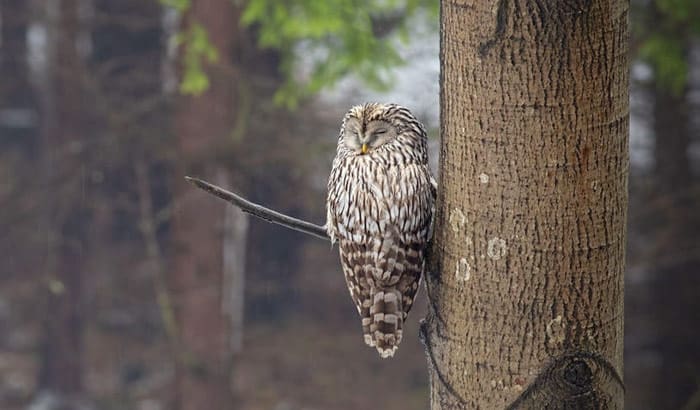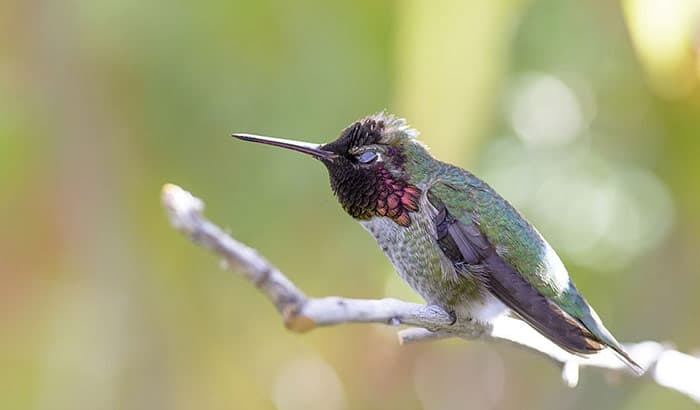Have you ever seen birds sleeping and wondered why they sleep standing up? The answer is actually very simple: birds do not need to lie down to sleep.
Sleeping in the standing position benefits them as they can stay alert even while resting. Also, they feel comfortable sleeping like that, contrary to our impression that such a habit must be inconvenient.
There are many interesting facts about birds’ sleeping habits; check the information below.
Contents
Why do Birds Sleep Standing Up?
Birds sleep standing up because their bones are hollow and their legs are filled with air. Therefore, they can be light enough to stand on their legs but still maintain enough pressure to keep them upright. Their feet and legs act as braces and give them support.
Birds need a lot of energy for flight, so birds don’t want to waste any time sleeping. They also have a problem overheating when they lay down, and the air around them cools off. Sleeping standing up helps birds conserve energy and prevents them from getting too hot.
How do Birds Sleep Without Falling Down?
When a bird lands on a perch, it uses its talons to grip the perch. During sleep, birds relax their muscles and let go of the perch with their talons. To keep from falling off the perch, birds use two mechanisms:
- They rotate their heads to look in the opposite direction from where they are sleeping. This habit keeps them aware of what is happening around them and helps them stay upright
- They tuck their heads under their wings to keep themselves stable. Some birds also wrap one leg around the perch for extra stability
Interesting Facts About Birds’ Sleeping Habits
Why do Birds Sleep on one Leg?
Birds sleep on one leg to conserve energy while roosting. A bird’s legs can get cold, and they would risk losing them if they were not covered up when sleeping. So by keeping this limb warm, it protects itself from injury or worse (death).
Since birds do not have a lot of body fat for insulation like we do, conserving heat is very important to survive at night. By tucking the leg under their feathers, birds keep themselves nice and cozy through the night.
Interestingly, birds are not the only animals that sleep on one side. Dolphins and sea lions also sleep this way to keep hydrated. When they are sleeping, their brain shuts down one half so that the other side can stay alert and watch for predators. This habit also helps them conserve energy while resting.
So next time you see a bird perched on a tree with one leg tucked under its body, know that it’s doing everything it can to stay safe and warm!
Do Birds Sleep with their Eyes Open?
Birds’ sleeping habits are different from humans’ in more ways than one.
Sleeping and waking are like turning off a light switch for birds: there is no middle ground between the two states.
So, Do birds sleep with their eyes open? Some birds do
According to research done at the University of Pisa, birds sleep with their eyes open and half shut. The birds were kept in the dark room until they fell asleep, then raised lights shone on them, causing them to open their eyes and look around.
Birds may be able to get some REM or deep sleep during that short window of time when they’re awake at night, so even if it doesn’t seem like much shut-eye.
How Long do Birds Sleep?
Birds have different sleep needs based on their species. Generally, birds need around eight hours of sleep a day but can vary based on the time of year and other factors.
Some birds, like parrots, can be more active and might only need six or seven hours of sleep a day.
Other birds, like owls, are nocturnal and might need up to ten or eleven hours of sleep per day.
How do Birds Sleep while Flying?
Birds have to sleep while they’re flying. It’s a technique called “sustained flight torpor.” They go into a state of reduced activity where their heart rate, breathing, and blood pressure drop. This allows them to save energy while they’re in the air. Scientists aren’t sure how birds manage to stay asleep while they’re flying, but it seems to work for them!
Some birds can even sleep with one eye open. The eyelid of the sleeping eye drops down partially, so the bird can still see out of it.
Conclusion
Birds sleep in a variety of ways, but one thing is certain. They need to get enough rest to stay healthy and fly around the world to find food for their family.
With warmer seasons quickly approaching, you must make sure your bird gets plenty of time each day. Also, allow your birds to have an adequate place to roost inside at night. This will help them maintain good health during the summer months when there are fewer hours of light available for our feathered friends to feed on insects all day long!


